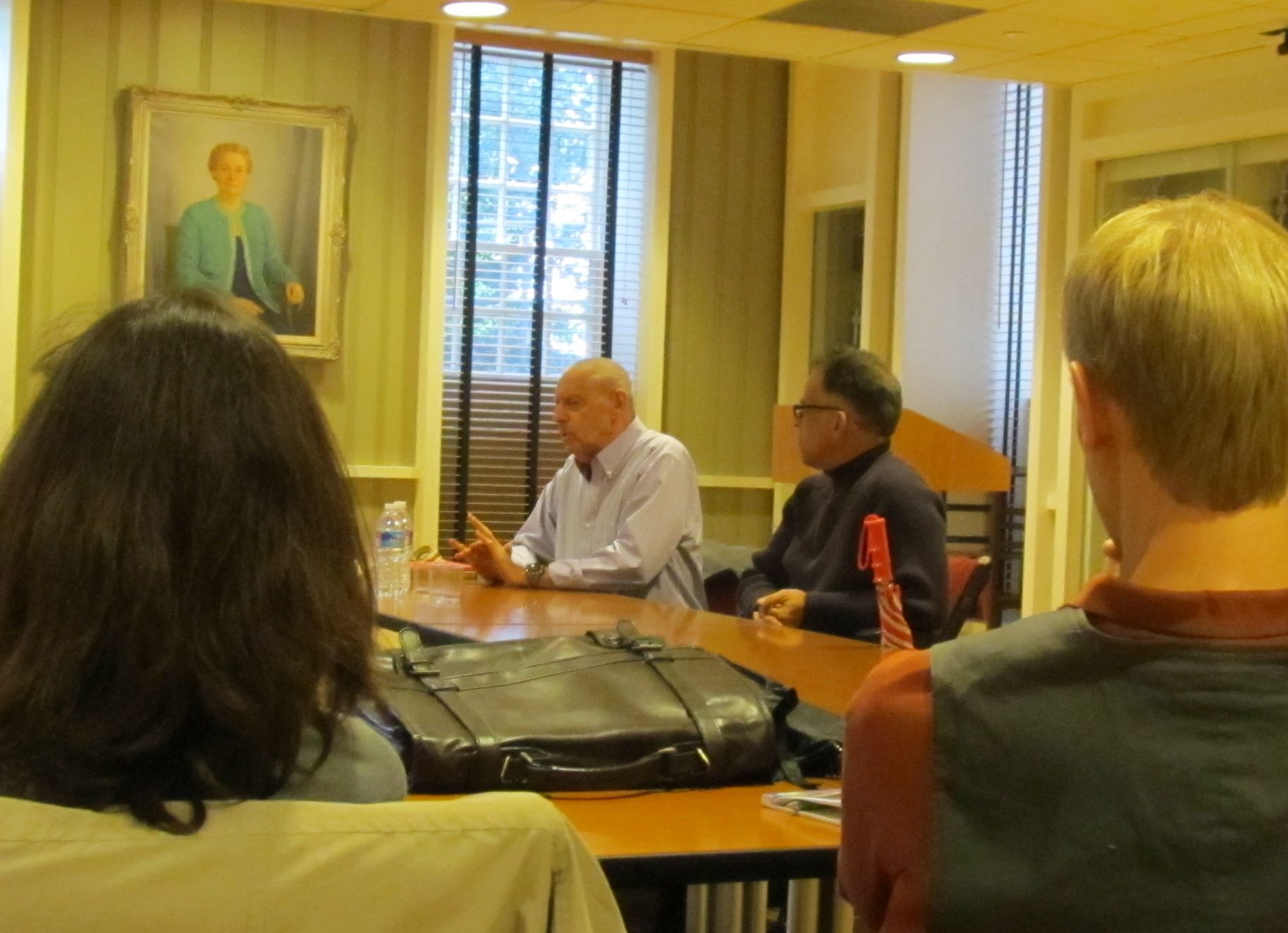José Kozer Comes to Maryland
October 18, 2013

Celebrated Cuban poet engages students in a poetry reading and panel discussion.
Celebrated Cuban poet engages students in a poetry reading and panel discussion.
On October 9 and 10, the Department of Spanish and Portuguese hosted Cuban poet José Kozer for live poetry readings and guided discussions. Now living in Hallandale, Florida, Kozer is originally from Havana, Cuba, and writes the majority of his poems in his native language of Spanish. This year, Kozer won the Pablo Neruda Ibero-American Poetry Prize, which included $60,000, a medal, and a reception by Chilean president Sebastián Piñera.
In the Crossland Room in Stamp Student Union on October 9, Kozer started with a brief segment from the prologue of his most recent book, Ánima, released in 2011 with English translations by Peter Boyle: “A sixty-year-old man writes a poem and entitles it ‘Anima.’ Days later he writes another poem with a tone similar to the first, entitles it ‘Anima,’ then realizes he has just begun a series which must all bear the same title.”
Yet even as each poem bears the same title (“Ánima,” Spanish for “spirit”), the topics vary widely, from Kozer’s coming of age in Havana, his relationship with his family—especially his father—his Jewish faith, and his surmisings about the direction and purpose of human existence. He read a selection of poems in Spanish from Ánima and from Stet, another collection of poems published in 2006. With his left hand he held the books steady on the table, and as he spoke, raised his right hand as a conductor might twirl a baton, articulating each word with a delicate gesture in midair:
A tedious adolescence on a tropical island.
All I remember is a table some parents at the table a
sister: the sum of thousands
of days with their middays
(lunch at one).
The following day, Kozer met with graduate students and professors in Marie Mount Hall for a panel discussion. Department chair Juan Carlos Quintero Herencia opened with a question about the relationship between poetry and memory. “Everything that becomes memory is unstable,” Kozer responded, adding that while he draws on memories to write his poems, he recognizes that these fragments of the past cannot be considered perfectly accurate or truthful. “But reality is also a fiction, also a construction,” he said. To him, there can be no such thing as a concrete memory, but there can be concrete desires, and combining what is concrete with ambiguity and marginality can make his poems meaningful.
Kozer also gave some practical advice to the graduate students in attendance, many who lamented the relative lack of poetry in school curricula. One graduate TA in particular had had a somewhat disenchanting experience with his undergraduate students: he gave his students a quiz to identify if a given line of poetry was written by revered Chilean poet Pablo Neruda, or by pop icon Taylor Swift. The TA was surprised to find that many of his students struggled to identify the difference.
“Without books, a nation cannot sustain itself,” Kozer agreed. Thus it is up to the next generation of educators to revive a literary culture which the poet worries is dying. He cited some of the main influences on his writing---Franz Kafka, Italo Calvino, Paul Celan, Julio Cortázar---and advised that graduate students make time each day to read, even if for only half an hour.
Students would do well to follow his advice, as it has produced extraordinary results: Kozer has been writing for four decades and writes at least one poem a day. His personal collection now totals over 9,000 entries. Kozer himself concedes that these are not always easy poems to understand, but all in attendance on October 9 were spellbound by the mystery and complexity of his verses, exemplified here in a poem in his “Ánima” series, read in Spanish and English on Wednesday:
Beyond the threshold I entered a street of sand, the Milky Way,
midday the mirage
of a single star.
I walk backwards, I know I’m walking backwards, I wander
up and down, noose
at my neck, lassoed
to myself, inwardly,
on the edge of crossing the
threshold everything
intact.
Samantha Suplee ('14, Spanish Language & Literature and History)
SLLC Public Relations and Media Intern
ssuplee@umd.edu

